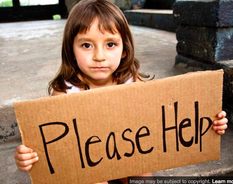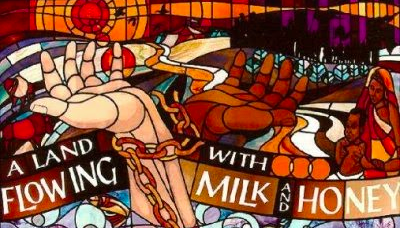Dangerous Sunday Morning Devotion: Can’t benefit from the milk if your can’t handle lactose8/16/2015
A while ago, I was reading a novel about the investigation of a mysterious plane crash. It was a great read. Enjoyed it immensely. It was entitled Crashers, written by Dana Haynes. “Crashers” is the name given to Go-Teams who are sent in immediately to investigate airline plane crashes, leading experts from specific fields vested in determining the cause of the crash, so it never happens again. In the midst of the storyline, a character, not necessarily religious, ponders a rather curious thought that got me thinking about the church and the poor. She said, "Land of milk and honey . . . Bloody lot of good it does if you can’t handle lactose and you’ve got diabetes to boot."
0 Comments
 Children who live in poverty are
“Everyone should just pull up their bootstraps and get to work, then they won’t be dependent on government or charity.” How many times do I hear this or something akin to it in words and attitude? Problem is, some people don’t even have boots; and some don’t even live long enough to put on these mysteriously, magically appearing boots. (As if everyone is born with these boots.) But enough of the clichés. Fact is we all certainly not on the same playing field; some experience major setbacks, obstacles, and barriers that prevent them from playing the game well, even on the field they have. (Sorry for another cliché and metaphor, but you get the point.) Children—at least the children that make up these demographic profiles—do not have the same level of access to the advantages of our own constitutional rights and economy. To put it in biblical terms, there are unjust situations within our communities that prevent children from growing up, getting an even start out in life, that oppress their abilities to access the same advantages of other children. Might this be what Isaiah meant when he rebuked Israel? “So as to deprive the needy of justice In light of facts like those listed above, we, too, should hear the prophet’s words, “Now what will you do in the day of punishment?” (Isaiah 10:3a). Perhaps, considering what you will do in these days can be a remedy for our indifference and privileged arrogance and the blight of those living with disadvantage.
 We do not typically approach the subject of evangelism and social action impartially, but with political, demographic, and religious preconceptions and biases. Opening up a conversation to re-assess the nature of evangelism is difficult, especially when social action and issues of poverty are injected into the discussion. The intent of Wasted Evangelism is not to debate the subject, or to review the history of the various positions regarding evangelism and social action, but to offer an exegetical and biblical theological approach to the question, Can social action be evangelism? It is important, nonetheless, to recognize there are barriers that can militate against an open discussion on the subject of evangelism and social action. For many, the meaning of evangelism is self-evident because of its association with “proclamation” activities (e.g., preaching, proclaiming, witnessing, etc.). Evangelism’s etymological relationship to the term “good news” (i.e., the evangel) can box one into defining evangelistic activity as passing on information, that is, to tell, preach, or share the news of Jesus Christ—that is, to evangelize. For many conservative evangelical Christians defining evangelism any other way causes the gospel (i.e., the news) to lose its meaning, robs the people of this important information, and diminishes the work of salvation in Jesus Christ. Evangelism’s strong association to the news of the gospel suggests to some that anything outside verbal, cognitive-based activities is a threat to the fundamentals of the faith. Additionally, those who have the highest interest in evangelism are often those least interested and least skilled in critical, theological reflection. Since evangelism is understood as a self-evident activity, rarely is the subject examined exegetically or evaluated theologically, but is usually consigned to matters of practical theology (e.g., missions, preaching, personal witness, church outreach programs, and church growth). (Meaning is often confused with application.) This, then, does not promote biblically relevant criteria to precede the discussion and, thus, limits the possibility of new, creative, and potentially sound understandings of biblical evangelism. Within evangelical circles, to advocate that social action can be evangelism is challenging, for such subjects as poverty and the poor are often relegated to the private sphere. Therefore, anything related to the public arena of rights, laws, and taxes or the confronting of social or governmental systems on behalf of the poor are often associated with the “social gospel” and the theologically liberal church. Although historically the church was deeply involved with issues of poverty, a “great reversal” took place between 1900 and about 1930. Evangelical fundamentalists turned away from their social responsibilities as a reaction against the social gospel that was perceived to be aligned with liberalism, which had diminished Bible infallibility and inspiration and weakened biblical views of sin, hell, salvation, and the deity of Jesus. When civic and political social concerns became suspect in the minds of evangelical academics and popular revivalists, social action responsibilities took on a minor role for much of the evangelical Christian community. Anything associated with the social gospel was considered a distraction and, to some, a betrayal to the fundamental essence of the gospel (i.e., the information, that is, the news of Jesus Christ). This history spills over into any contemporary discussion on evangelism and social action. There are also demographic barriers to an open discussion regarding the association between evangelism and social action. Over the last seven decades, people have been moving out of urban centers and into the suburbs, including Christians and their churches. The twin demographic forces of urban flight and suburban sprawl contribute to the evangelicals’ disassociation with issues of poverty and the poor. As a result, this social transformation helped reinforce a one-dimensional understanding of the gospel [see note below], which determines, for many, the nature of evangelism. Suburbanization of American society has moved much of the evangelical communities of faith outside populations affected by poverty. Rather than church communities promoting social action on behalf of poorer communities, the (upward) mobility of American families toward the suburbs demand that suburban churches serve a socializing and stabilizing function. Not a very likely set of social forces that will generate social change on behalf of the economically vulnerable hidden outside their neighborhoods and unknown within their circles of friends and acquaintances. The barriers reviewed here are not exhaustive, but are limited to those most relevant to the arguments and conclusions of the studies found in Wasted Evangelism. To overcome these barriers, these studies focus our attention to the text of Scripture, particularly the Gospel of Mark, as a basis for entering into a discussion on the biblical relationship between evangelism and social action. *From the "Introduction" to Wasted Evangelism. [Note] A one-dimensional gospel indicates solely a person/God dynamic relationship; whereas a multi-dimensional gospel includes the person/God dynamic and, also, creation/God, person/creation, and person/person. Wasted evangelism considers the multi-dimensional gospel more representative of a biblically sound narrative definition of the gospel. |
AuthorChip M. Anderson, advocate for biblical social action; pastor of an urban church plant in the Hill neighborhood of New Haven, CT; husband, father, author, former Greek & NT professor; and, 19 years involved with social action. Archives
February 2024
Categories
All
|
Pages |
More Pages |
|

 RSS Feed
RSS Feed